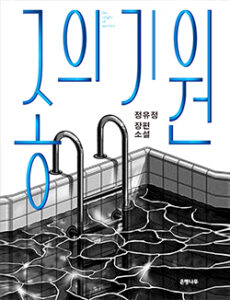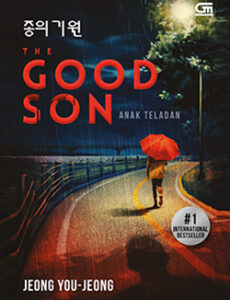2021 Participants
Juliana Tan
Past Program / 2021 Program / Juliana Tan
■ Juliana Tan asks Jinny H. Lee, editor of 〈The Good Son〉(EunHaengNaMu Publishing)


Q. Juliana Tan
How did you feel when you first received “The Good Son” manuscript? And what were your first thoughts after finished reading it?
A. Jinny H. Lee
Hello, editor Juliana Tan. I am Jinny H. Lee from EunHaengNaMu Publishing, an editor of 〈The Good Son〉. Nice to meet you online and thank you for editing the Indonesian version of 〈The Good Son〉. I would be happy if my answer helps you understand a little bit more about the Korean publishing market.
〈The Good Son〉 is the 4th novel of Jeong You-Jeong that we have published. We publish her novel every two or three years. Once her manuscript arrives, our CEO and all from our Korean literature team read it and give feedback to the author with the overall review, questions, or a request for a revision within a few days. As you know, Jeong You-Jeong’s work is unique and so gripping, so I couldn’t read that during work hours. So that day, after work was all done, I stayed in the office alone and read the manuscript. It was about 11 at night by the time I finished reading it. I remember my whole body was so tense that it seemed like I couldn’t go down the stairs by myself. Also, I had a surprising and strange experience as if I was looking into the head of the murderer, and at some point, I was terrified by discovering myself giving compassion and support for the main character.
Q. Juliana Tan
Are there many differences between the before-edited manuscript and the final version? What are they?
A. Jinny H. Lee
There is not much difference between the before-edited manuscript and the final version. We usually request some revisions after reviewing the manuscript, but each author seems to be different how much he/she accepts that. In the case of Jeong You-Jeong, she positively accepts the opinions of our publisher, and it was quite the same for 〈The Good Son〉. In the first manuscript, there was no prologue, which was included later. When we first received the manuscript, readers might feel burdened by having a start of the story in the very middle of the case, we thought, and we, the editorial department suggested to add a prologue. The author accepted that suggestion and added the prologue later.
Interestingly, as 〈The Good Son〉 was contracted with many publishers abroad, there was an opinion by the publisher that the prologue was unnecessary, so the prologue was omitted for the English version. But for the German version, the prologue was added like in the original as the German publisher said they needed a literary prologue. I wonder if there is a prologue in the Indonesian version or not.
Q. Juliana Tan
What aspects of a manuscript that you usually pay attention to while editing? And while working on “The Good Son” were there any difficulties?
A. Jinny H. Lee
We pay attention to conveying the story or messages better to readers, that author wants to convey through the book. Considering the story of 〈The Good Son〉 a bit uncomfortable for readers, we tried to emphasize a more literary message in the cover design and the text. More, considering the story is so dense, taken place over three days, and the author describes things very in detail, we paid a lot of attention not to have errors on sequences of the story or the movement of the characters, for example, checking whether the object that exists before does not disappear later.
Q. Juliana Tan
How long did it take you to edit the entire manuscript until it was ready to be published?
A. Jinny H. Lee
Unless there are any major problems, it usually takes about one and a half to two months after a manuscript arrives. For this book 〈The Good Son〉, it took a bit more time for the editor to discuss revisions with the author in order to find related materials or to check the facts. The author sent the manuscript of 〈The Good Son〉 in early March, and we published it after a week-long pre-order period in early May.
Q. Juliana Tan
What are your favorite parts or scenes in the novel “The Good Son”?
A. Jinny H. Lee
Not only were the scenes and the story of 〈The Good Son〉 strong, personally there were many sentences memorable. I was so surprised at how the author wrote such literary sentences to describe the inner world of a psychopath and such terrifying scenes. The most memorable sentences for me were the ones I used on the cover. “Fate always lurked; there might be time when it looked the other way, but that couldn’t happen more than one or twice. Things that were supposed to happen did happen and things that were supposed to come around did come around. Fate had sent an assassin, deciding at this very moment to carry out my sentence. It was only the most important moment of my life, and it was about to end in the cruelest way possible.” This is from the scene that Yu-Jin goes to a swimming competition and confesses after stopping psychiatric drugs. The sentence remained in my heart because it looked like a symbol that foretells the fate of his future life as a psychopath.
There are so many shining sentences like this hidden here and there in 〈The Good Son〉. I hope readers also find and fully enjoy these sentences even when they get carried away too much at the story.
Q. Juliana Tan
How was the communication with the author, Ms Jeong You-jeong? Did you work on her other works too? How did you become the editor of her books?
A. Jinny H. Lee
Jeong You-Jeong is an important writer having a solid readership in the Korean literature market. We have been publishing the works of Jeong You-Jeong for more than 10 years, and we understand a lot about the world of her works and style. And, since she also understands a lot about our publishing process all the way through, there was no difficulty in communicating with each other. Usually one editor takes charge of proofreading for the works other than 〈The Good Son〉, but for this book 〈The Good Son〉, it was a kind of company-wide project. Our CEO and I offered opinions and got involved in all fields such design, editing, and marketing.
Q. Juliana Tan
In Korea, how do authors submit their works to publishers? Do they have to have an agent first like the practice in the US or UK?
A. Jinny H. Lee
Author’s agents are not so common in Korea yet. There are a few such movements these days, but they are not yet common. Usually, a publisher offers a contract for the next work to a competent author, and the manuscript is completed, then is published soon after. A manuscript can be completed within a year, and sometimes 10 years or more, but publishers are willing to wait to publish a good work by a good author. The other way round, some writers complete manuscripts and offer to publish them through the publishers’ editors or by submission. This is usually the case for aspiring writers, new writers or lesser-known writers, and there seem not many cases to become published.
